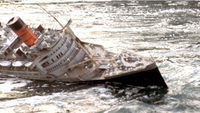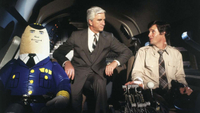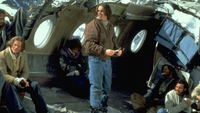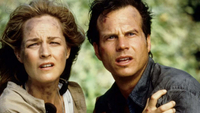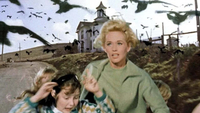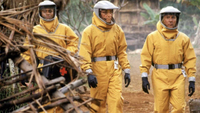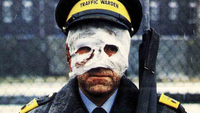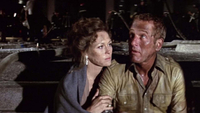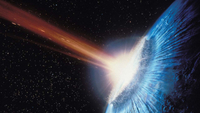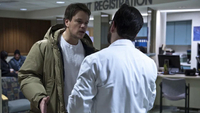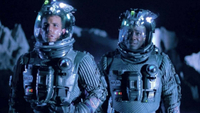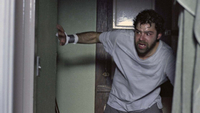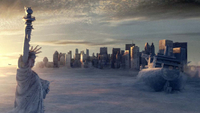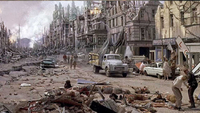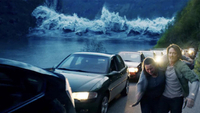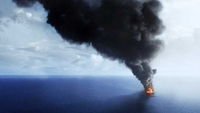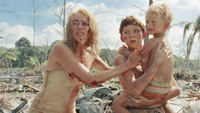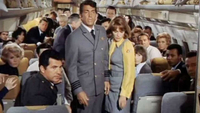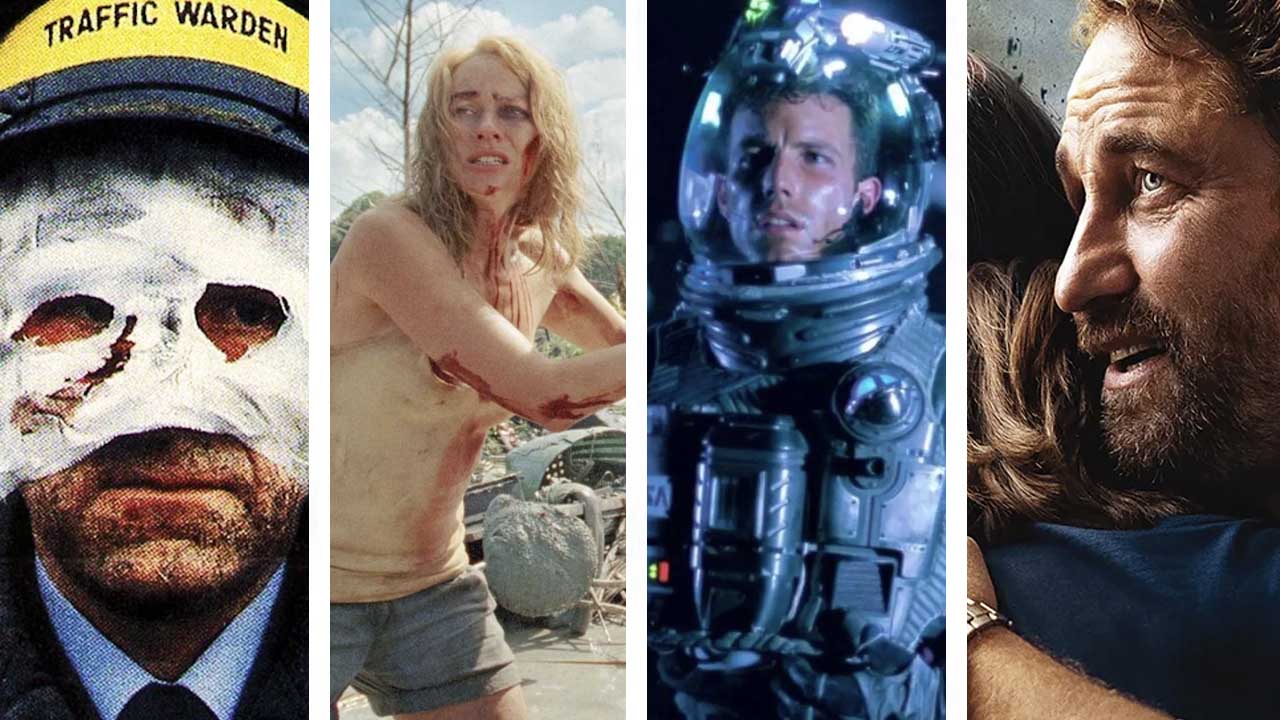
Twisters is blowing the box office away right now. Directed by Lee Isaac Chung (Minari) and starring Daisy Edgar-Jones and Glen Powell, it’s a direct follow-up to the Jan de Bont original that blew through cinemas in 1996.
The first Twister movie ticked a lot of ’90s action-thriller boxes, but with its focus on unstoppable weather events it also tipped its hat to a rich heritage of disaster movies. We thought we’d do the same.
So how exactly are we defining a disaster movie here? As pithy summaries go, we’re quite content to go with the Wikipedia entry: “a film genre that has an impending or ongoing disaster as its subject and primary plot device”.
There’s a fateful air to any good disaster movie that sets it apart from your average action or thriller film. Bad things are going to happen, people are going to die, and we’re often rooting for our heroes to simply endure rather than to necessarily come up with an ingenious plan.
This leaves a lot of scope for playing in between the lines when it comes to the style and tone of a disaster movie. As such, the following feature contain movies that would comfortably fit into separate action, sci-fi, real life drama, or even comedy genre round-ups.
Which of these disaster movies is your favourite? Be sure to vote below.
Come on people. We can get through this. Or at least, some of us can.
Get exclusive shortlists, celebrity interviews and the best deals on the products you care about, straight to your inbox.
20 best disaster movies
Far from the YA greek mythology yarn the title might suggest it to be, The Poseidon Adventure is actually one of the great disaster movies from the golden age of the format. Gene Hackman’s unorthodox Reverend Frank Scott and Ernest Borgnine’s Detective Lieutenant Mike Rogo lead a motley group of survivors through a precariously upturned ocean liner. This is the perfect example of how they did it in the ’70s: assorted Hollywood stars playing a range of archetypes, all dying in a bunch of arbitrary yet horribly creative ways.
So ubiquitous had the disaster movie genre become by the end of the 1970s, and so ingrained in popular culture, it became ripe for a send-up. That’s just what it got in 1980’s Airplane!, which closely followed the melodramatic plot (and exclamation mark) of 1957’s Zero Hour!, as well nodding to the Airport films of the ’70s, but also inserted a rich seam of absurdist humour. Leslie Nielsen, Lloyd Bridges, and Robert Stack are among the established cast supplying commendably straight faces in this story of a commercial jet rendered pilotless on an LA to Chicago flight.
Proving disaster movies can be restrained and thoughtful, Alive tells the true story of a young Uruguayan rugby team whose rickety plane crashed in the Andes in late 1972. The ensuing tale of survival is harrowing stuff, with the survivors forced to take drastic measures as conditions worsen and their food supplies dwindle. Ultimately, though, it’s a classic story of brotherhood, triumph in the face of adversity, and the indomitable human spirit. Netflix recently re-adapted the story as a mini-series, but this original adaptation remains compelling stuff.
The film that prompted the sequel that kicked off this whole darned list, as well as potentially kicking off a fresh spate of disaster movies. We’d say it’s the butterfly effect, but it would take a pterodactyl-sized insect to create a tornado as big as those found in Jan de Bont’s 1996 thriller. Helen Hunt and Bill Paxton play the divorced storm chasers tracking freak weather conditions across an obliterated Oklahoma. The storm effects, for the time, were astounding, and the racket they create will annoy all of your neighbours if you have a half-decent sound system.
It could be argued Alfred Hitchcock’s 1963 film belongs to the horror genre as much as anything, as several traumatised generations of viewers will no doubt confirm. However, its depiction of the natural world inexplicably turning against humanity in the form of killer birds also gives it the feeling of a disaster movie. Rod Taylor and Tippi Hedren play the would-be lovers who suddenly find that their local crows, gulls, and chickens aren’t quite so docile as they used to be.
There’s a whole sub-genre of disaster movie that doesn’t involve any form of material destruction at all, and such medical-based variants are perhaps all the scarier for it. Outbreak arrived smack bang in the middle of the ’90s when national monuments were being swept away left, right, and centre on screen, yet it promptly spooked us all with its tale of a deadly virus sweeping the world. Dustin Hoffman plays the obligatory virologist racing to contain it, while Morgan Freeman does his distinguished authority figure thing as a general with a troubled conscience.
As anyone around in the 1980s will tell you, the prevailing global fear at the time was of nuclear destruction. This was drummed into British Gen Xers and older millennials by the BBC movie Threads, which offered an unflinchingly realistic look at how events might fold in a typical English city (Sheffield) should the unthinkable happen. As supply lines suffer and societal order rapidly breaks down, Threads bravely refrains from offering anything in the way of false hope. In that sense, it’s a disaster movie of the purest kind.
Irwin Allen was an early master of disaster, and he quickly followed up on The Poseidon Adventure (also on this list) by producing this other foundational text. Rather than the previous film’s capsized ship, this time a cast of squabbling survivors (played by some of Hollywood’s then-finest) find themselves fleeing a burning skyscraper. Steve McQueen’s commanding fire chief and Paul Newman’s upstanding architect take command of efforts to lead the group to safety. Needles to say, they’re only partially successful.
If you need any proof that the late ’90s was the second (or should that be third?) golden age of the disaster movie, consider the fact 1998 alone saw the release of two doomy asteroid-based flicks. Armageddon might have raked in most of the money and attention, but Deep Impact was the more thoughtful and plausible film. While it too tracks Earth’s efforts to avoid an extinction-level collision using nuclear weapons, it also shows the many devastating effects such a momentous event would have on Earth’s inhabitants and infrastructure.
Some 16 years after Outbreak had us all considering masking up, Contagion gave us another compelling medical disaster movie. Stephen Soderbergh offers a much less bombastic and more grounded take on how the world might react to a highly contagious new disease. Prescient subject matter aside, this still sticks to the classic disaster script in one crucial way: a cast full to bursting with Hollywood talent (Marion Cotillard, Matt Damon, Laurence Fishburne, Jude Law, Gwyneth Paltrow, Kate Winslet, Bryan Cranston), many of whom would snuff it well before the closing credits.
In many ways, Armageddon is not a ‘good’ movie. Its story of a hardy group of drillers sent on a one-way mission to destroy an extinction-threatening asteroid hurtling towards Earth is ludicrously plotted, clunkily written, and hammily performed. But it’s also one of the defining disaster movies of the ’90s, with an all-star cast (Bruce Willis, Ben Affleck, Liv Tyler, Billy Bob Thornton, Steve Buscemi) and a whole bagful of memorable histrionics. It’s so preposterous, it even got its own hit Aerosmith song.
What’s this? A recent Gerard Butler movie that doesn’t suck? Now that sounds more like a miracle film than a disaster film. Butler plays structural engineer John Garrity, who one day receives a government message instructing him to report to an emergency shelter. It turns out the Earth is on a collision course with a giant comet, and Garrity and his family have been selected to wait out armageddon in a bunker and rebuild the world. Things go awry, and our hero eventually finds himself desperately heading for a mythical last-chance shelter in Greenland.
This heart-stoppingly believable low-budget film seems to have been all but forgotten since its 2006 release, but anyone who saw it at the time will attest to its deep and lasting impact. Indeed, while it’s clearly a post–9/11 film, its relevance remains undimmed. Chris Gorak’s film follows an average American couple as they respond to the news of a dirty bomb attack in their city. Scenes of government-mandated quarantine, separated families, and civil unrest hit in a different way following the COVID–19 lockdown.
Few living directors are quite so accomplished at wide-scale destruction as Roland Emmerich, whether through aliens (Independence Day), monsters (Godzilla), or even the moon (Moonfall). The Day After Tomorrow goes with a far less fanciful culprit in the form of the climate, as human neglect places the world on the brink of a new and sudden ice age. Weather conditions become increasingly extreme as a giant hailstorm levels Tokyo and tornados rip through LA. It’s not the most nuanced take on the climate emergency, but The Day After Tomorrow sure is entertaining.
Arriving right in the middle of a spate of disaster movies in 1974, Earthquake sees Charleton Heston, George Kennedy, Ava Gardner, Genevieve Bujold, and Lorne Greene play ordinary people struggling to survive a huge earthquake measuring 9.9 on the Richter Scale. The level of destruction depicted on screen was truly something at the time of the film’s release, and while it looks a little questionable by today’s standards (and we’re not just talking about Heston’s two-timing ‘hero’) Earthquake still creates an impressive sense of city-levelling chaos.
Proving Hollywood doesn’t have a monopoly on cinematic destruction, The Wave depicts the decimation of a Norwegian village under a huge tidal wave. While such fjord-filling forces are rendered in fairly typical fashion, the movie goes well beyond usual disaster movie tropes by taking its time to paint believable and sympathetic characters, and to keep the focus on human suffering rather than property damage. The end result is you actually come to care about the people being swept away.
Peter Berg’s hard-hitting film tackles the 2016 explosion of the titular oil rig, which killed 11 crewmen and led to the worst maritime oil spill in history. For all the inevitable pyrotechnics, Berg never forgets that this was a real life tragedy, and an avoidable one at that. He doesn’t hold back in pointing fingers at the corporate neglect of a certain British petroleum company responsible for operating the rig. Mark Wahlberg is perfectly cast (who said ‘for once?’) as the technician caught in the middle of a man-made maelstrom.
Proof you don’t need asteroids, ocean liners, or even a swollen Hollywood cast list to make a good disaster movie, The Impossible loosely recounts the true tale of a young family holidaying in Thailand during the 2004 Indian Ocean tsunami. Scenes of the immense flooding, death, and destruction visited upon this one tiny beach resort are all the more harrowing for knowing that they actually occurred. There are strong central performances, too, from Ewan McGregor and Naomi Watts as the frantic parents, as well as a pre-Spider-Man Tom Holland as their young son.
We all know the deal with this one. Titanic is one of the biggest movies ever about one of the most famous real life disasters, and it hit the box office with the force of a recklessly speeding ocean liner. The tale of doomed lovers Jack (Leonardo DiCaprio) and Rose (Kate Winslet) falling for each other on the fateful maiden voyage of the RMS Titanic has become cinematic legend, making it arguably the ultimate disaster movie of any era. There aren’t many films of this type that pull on the heart strings quite so assertively or effectively.
Landing in 1970, Airport was so successful it spawned an entire decade of similarly themed disaster movies built in its soapy image, including three sequels. Decades later, Airplane! would spoof many of the tropes that it set forth. Burt Lancaster plays the chisel-jawed manager of a US airport who must juggle a complicated love life whilst dealing with a freak blizzard. Meanwhile, pilot Dean Martin (no, really) has to manage a mid-flight suicide bomb threat, as well as his own marital problems. Deliciously schlocky stuff.
Jon Mundy is a freelance writer with more than a dozen years of experience writing for leading tech websites such as TechRadar and Trusted Reviews.

